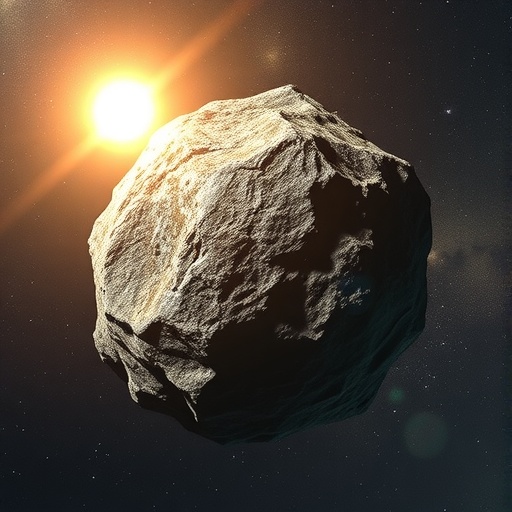A groundbreaking discovery made by a team of researchers from the University of Tokyo has unveiled a paradigm shift in our understanding of water’s role in the evolution of asteroids, particularly the near-Earth asteroid Ryugu. The findings, derived from microscopic samples collected by the Hayabusa2 spacecraft, suggest that liquid water may have flowed through Ryugu’s rocky surface billions of years after the asteroid was formed. This revelation overturns the long-held belief that water activity in asteroids ceased soon after they were created, significantly impacting models regarding Earth’s formation.
The research emphasizes that the insights gained from Ryugu significantly contribute to a crucial aspect of planetary science: the origins of water on Earth. Scientists have long grappled with the puzzle of how Earth accumulated such a vast supply of water. Traditionally, it was hypothesized that carbon-rich asteroids like Ryugu, which formed from primordial ice and dust in the outer solar system, contributed to Earth’s hydrosphere during its infancy. However, continuous advancements in space exploration are reshaping our understanding of these astronomical entities’ role in Earth’s history.
One of the researchers, Associate Professor Tsuyoshi Iizuka from the University of Tokyo’s Department of Earth and Planetary Science, articulated the significance of this discovery: “We found that Ryugu preserved a pristine record of water activity, evidence that fluids moved through its rocks far later than we expected.” This newfound understanding suggests that water can persist in asteroids for extended periods, leading scientists to rethink the dynamics of water in the solar system.
The crux of the discovery lies in the isotopic analysis of lutetium (Lu) and hafnium (Hf) found within the asteroid’s rocky remnants. These isotopes undergo radioactive decay, and their ratios serve as a geological clock, marking significant events in the rock’s history. Researchers anticipated a specific relationship between the quantities of these isotopes based on the asteroid’s age. However, the results showed an unexpectedly high ratio of Hf to Lu, which implies fluid interactions affected the isotopic composition, suggesting that water was actively moving through the asteroid’s structure.
Iizuka further explained the implications of the findings: “We initially expected Ryugu’s chemical record to resemble that of certain meteorites previously studied on Earth. The actual results, however, were completely different and pointed to a late fluid flow in the asteroid’s geological history.” This suggests a more complex scenario in which an impact event likely triggered fluid movement by fracturing the asteroid’s parent body, releasing buried ice that subsequently transformed into liquid water.
The implications of these findings extend beyond Ryugu itself. It raises questions regarding the potential for other carbonaceous asteroids to have retained water far longer than previously believed. The research posits that the parent body of Ryugu likely maintained its ice reserves for over a billion years, suggesting that other similar bodies that struck the early Earth may have delivered significantly more water than existing models currently account for.
This theory has profound consequences for the evolution of Earth’s early oceans and atmosphere. Iizuka noted, “The notion that Ryugu-like asteroids could retain ice for such extended periods is remarkable. It points toward the possibility that the primordial building blocks of Earth were much wetter than previously assumed.” By reshaping our understanding of the conditions under which Earth formed, these findings could help clarify the timeline for when our planet became habitable.
Despite the Hayabusa2 mission returning only a few grams of material from Ryugu, researchers faced significant challenges in maximizing the data extracted from these small samples. Each experiment required the use of a few tens of milligrams, demanding innovative methodologies to analyze isotopes with precision. This endeavor led to the development of sophisticated chemical techniques aimed at minimizing loss while still isolating key elements from the samples.
The researchers are currently planning further studies to explore phosphate veins within the Ryugu samples which could provide even more insights into the asteroid’s geological timeline. Additionally, by comparing their findings with samples taken from asteroid Bennu by NASA’s OSIRIS-REx spacecraft, the team hopes to determine whether similar water-related activity occurred in other celestial bodies or if Ryugu’s case is unique.
As researchers delve deeper into the mysteries of asteroids like Ryugu, they hope to gain a clearer picture of how water was stored, mobilized, and ultimately delivered to Earth. This ongoing inquiry not only reshapes our understanding of planetary habitability but also underscores the intricate connections between celestial bodies and the formation of our home planet.
The research makes significant strides toward bridging critical gaps in our understanding of solar system evolution and the conditions that led to the emergence of life on Earth. The discovery of late fluid activity on Ryugu represents a vital chapter in the ongoing quest to uncover the origins of essential resources such as water, further emphasizing the need for advanced explorations into these enigmatic extraterrestrial bodies.
In conclusion, the revelations from the Ryugu research showcase the important role that contemporary space exploration plays in advancing our knowledge of planetary science. As we continue to unravel the complex history of our solar system, the long-standing question of how Earth acquired its water becomes increasingly linked to our understanding of asteroids and their geological processes. The impact of these findings cannot be overstated, as they not only provide fresh insights into the evolution of our planet but also open new avenues for exploration and inquiry into the cosmos.
Subject of Research: Water retention and fluid activity in the asteroid Ryugu
Article Title: Late fluid flow in a primitive asteroid revealed by Lu–Hf isotopes in Ryugu
News Publication Date: 10-Sep-2025
Web References: N/A
References: N/A
Image Credits: ©2025 Iizuka et al. CC-BY-ND
Keywords
Asteroid Ryugu, Water, Isotopes, Geology, Planetary Science, Origin of Water, Hayabusa2, Earth Formation, Solar System Evolution, Cosmic Exploration.




